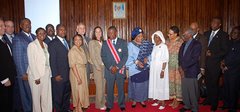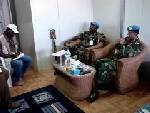

THE HAGUE, Netherlands (AP) - Former Liberian President Charles Taylor, accused of orchestrating unspeakable atrocities during neighboring Sierra Leone's bloody civil war, goes on trial today — the first African leader to face justice at an international tribunal. Prosecutors allege that, in return for diamonds illegally mined in Sierra Leone, Taylor armed, funded and controlled rebels who murdered, raped and mutilated civilians before looting and torching their villages in a campaign of terror aimed at destabilizing the government in Freetown.
Taylor, 59, who has pleaded not guilty to 11 charges of war crimes and crimes against humanity, faces a maximum sentence of life imprisonment if convicted. His trial is expected to last 18 months.
The atrocities in Sierra Leone's 1991-2002 civil war are well-documented: Fighters — often children drugged and turned into merciless killers at brutal rebel training camps — killed thousands of men, women and children and mutilated more by hacking off hands and limbs with axes and machetes. Women were raped and abducted to become sex slaves.
Many victims had the initials of rebel groups carved into their skin with burning-hot bayonets. Children were sent out with burlap bags to hack off and collect limbs and were punished if the bags were not full when they returned.
On Monday, prosecutors were to deliver an opening statement outlining to the three-judge panel how they intend to link Taylor to the crimes. Judges rejected a request from Taylor to make a statement on Monday. The trial then will adjourn until June 25 to give defense attorneys more time to prepare.
When witnesses begin testifying, survivors will take the stand along with former allies from Taylor's inner sanctum, who will be critical to proving he controlled rebels responsible for atrocities in another country.
Many will testify anonymously for fears of reprisals from Taylor supporters, and some will be put in witness protection schemes after giving evidence.
"Prosecutors will have to prove that the linkage exists between Taylor's alleged participation in the crimes and the crimes themselves," said Elise Keppler of Human Rights Watch. "There is no question these kinds of cases are difficult; they are complex."
That complexity was best underscored by the ill-fated case against former Yugoslav President
Slobodan Milosevic' name=c1>SEARCHNews News Photos Images Web' name=c3>
Slobodan Milosevic, whose genocide trial dragged on for four years at the Yugoslav war crimes tribunal before being aborted weeks from a verdict when Milosevic died in his cell.
Despite the difficulties, the Taylor trial has been hailed as a watershed for war-torn western Africa and its people.
"The beginning of this important trial truly does show them that the rule of law is more important than the rule of the gun," said David Crane, a former chief prosecutor at the Special Court for Sierra Leone.
"It's a time in the history of Africa that the leaders ... go on notice that they just cannot destroy their own people for whatever purpose," Crane added.
But supporters, including Taylor's daughter Charen, who grew up in the United States and dropped out of college to help organize his defense, say Taylor has been unfairly targeted by prosecutors.
"He's taking the blame for what others did," she said.
Avi Singh, one of Taylor's lawyers, complained that the defense team has not had enough time to prepare. Singh also repeated a claim of defense attorneys that some witnesses they want to call have refused to testify for fear of being slapped with U.N. travel bans as Taylor allies.
In the Liberian capital, Monrovia, supporters have put up billboards showing Taylor waving triumphantly next to the words: "God willing, I shall return."
Taylor, a former warlord who was elected Liberia's president in 1997, was indicted in 2003, accused of sponsoring Sierra Leone's rebel Revolutionary United Front in exchange for diamonds. Taylor agreed to give up power and go into exile, but was taken into custody in March 2006 as he tried to cross the border from Nigeria to Cameroon.
He was transferred to The Hague a year ago amid fears his trial in Sierra Leone could trigger fresh violence in the capital, Freetown. His trial will take place in a court room rented from the International Criminal Court.
Crane said he was disappointed the trial is not happening in Freetown.
"We have the courtroom to do it, we certainly have the security to do it, however we have to respect the wishes of two current sitting presidents who felt that keeping Taylor regionally would be just too much stress and strain politically as well as security-wise," he said.
___


